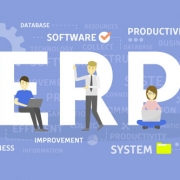10 most powerful ERP vendors today
Enterprise resource planning (ERP) is no doubt becoming a necessity for any business. With its strategic importance for organizations who seek to digitize and automate business processes, modernize their application stack, migrate to the cloud, and accelerate the speed of business, having the right ERP system is critical for business success. Selecting the right ERP system is an important decisions, and knowing everything the vendor has to offer is a must for your organization’s personal checklist. Tech expert Neal Weinberg shares an article on CIO highlighting the most powerful ERP vendors who dominate the space and why they rightfully earn their place at the top. “In terms of market share,” says Weinberg, “there’s a clear demarcation between the Big 3 — SAP, Oracle, Microsoft — and everyone else. The Big 3 strive to offer the broadest suites of ERP offerings, whereas smaller competitors try to differentiate themselves with deep insight into business processes for specific vertical industries.”
- SAP: Restructuring to target AI. “Pure-play powerhouse SAP is the runaway market share leader with a vast installed base of large enterprise customers. Through deep discounts and other incentives, SAP is successfully moving customers from its rigid on-premises ERP platform to the S/4 HANA Cloud, a fully managed SaaS solution with modules that cover all of the ERP bases.”
- Microsoft: Powerful integration of genAI features. “Gartner puts Microsoft in the visionary category in its latest Magic Quadrant for ERP systems for service-centric organizations. Dynamics 365 is primarily a SaaS solution hosted as a managed service. The advantage Microsoft has is that it has integrated its ERP capabilities with the rest of the Microsoft ecosystem, including the Azure cloud and applications such as Power BI, Power Apps, and Dataverse. In addition, Dynamics 365 is both an ERP and a CRM, which creates integrations across sales, marketing, and customer service.”
- Oracle: Two-headed ERP monster. “Oracle’s one-two punch of Oracle Fusion Cloud ERP for the largest of enterprises and Oracle NetSuite for smaller companies gives the company a unique market position. Gartner puts Oracle Fusion Cloud ERP in the Leader category for its modular and configurable ERP offerings that can run in Oracle data centers, in the Oracle cloud, or at customer sites.”
- Infor: Industry-specific solutions. “Infor doesn’t shy away from competing against the top players for the biggest accounts. Infor’s differentiator is its industry-specific ERP solutions that combine technology with invaluable knowledge of how business processes work in industries ranging from healthcare to aerospace. Says Forrester analyst Liz Herbert, ‘Companies that are on the larger side generally get attracted to Infor because they find it to be a good solution that is more affordable, and also a vendor that is easier to do business with than SAP or Oracle but still has credibility and proof points in large and global enterprises.'”
- Workday: Managing human capital. “Workday is a Leader in Gartner’s Magic Quadrant for service-centric ERP with its focus on HR (Workday Human Capital Management) and financial management (Workday Accounting Center). The Workday Enterprise Management Cloud is aimed at upper-midmarket, large and global organizations, but also has many customers with annual revenue of less than $150 million, says Gartner.”
- Epicor Software: Focusing on ‘cognitive ERP’. “Epicor’s Industry ERP Cloud provides industry-specific packages: Kinetic for manufacturers; Prophet 21 for distributors; Eagle and Propello for retailers. Most of Epicor’s customers are midsize companies in automotive, building supply, distribution, manufacturing, and retail verticals. Epicor’s roadmap focuses on AI-enabled supply chain data and analytics, including the use of genAI and sustainability capabilities.”
- IFS: Manufacturing innovation. “The IFS Cloud is a powerful ERP system targeted at manufacturing, aerospace, defense, construction, engineering, energy, utilities, food and beverage, and chemical industries. Customers are primarily midsize, but IFS also competes for business from the largest enterprises as well. Listed as a visionary in Gartner’s Magic Quadrant for product-centric ERP, IFS invests heavily in manufacturing-centric features such as digital twin, smart factory capabilities, and shop floor integrations for real-time planning and execution.”
- Sage: Accounting and finance for SMBs. “Sage is a leader in ERP systems focusing on accounting, finance, HR, and payroll for small and midsize businesses with its two product lines, Sage Intacct and Sage X3. Sage’s ERP is cloud-based and the company offers services to help organizations migrate their apps to the cloud.”
- Acumatica: A modular approach to cloud ERP. “Acumatica is a leader in the SMB market, with its industry-specific modules for manufacturing, construction, distribution, retail, and general business. Acumatica is cloud-only, and its strength is the modular nature of its architecture, which enables customer to select only the capabilities it needs.”
- QAD: Manufacturing and supply chain innovation. “QAD is a visionary in Gartner’s Magic Quadrant for its Adaptive ERP product suite that provides administrative and operational ERP capabilities on a single platform. QAD primarily targets six manufacturing sectors: automotive, consumer products, food and beverage, high tech, industrial, and life sciences.”




Leave a Reply
Want to join the discussion?Feel free to contribute!